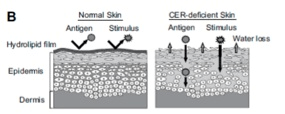
SENSITIVE SKIN:
Also known as hyper-reactive or intolerant, sensitive skin overreacts to normally well-tolerated stimuli. This is how ultraviolet radiation, temperature variations, wind, certain cosmetics, pollution, a strong emotion, menstruation, etc. become all aggressions for the epidermis.
Skin sensitivity is essentially a subjective notion, as sensitive skin does not necessarily show a visual sign on clinical examination. However, the points of view agree to recognize as characteristic manifestations of this disorder, the tightness, tingling, warming up and itching.
To these feelings of discomfort are sometimes added a dry skin, a fine flaking or diffuse redness.
Finally, it is not uncommon for dermatoses such as seborrheic dermatitis, contact eczema or psoriasis to be associated with sensitive skin.
Complex skin sensitivity syndrome can affect all skin types, whether dry, normal, combination or oily. In addition, this phenomenon affects populations of various ethnic origins since it is encountered in all industrialized countries.
Epidemiology
Epidemiological studies show that skin sensitivity is a very common disorder. In Europe, its prevalence rate, already estimated at 50%, is constantly increasing. In France too, half of the population is estimated to be affected, with about 45% of men and 60% of women reporting having sensitive or very sensitive skin.
No less than 28% of subjects with very sensitive skin say they are affected by an associated dermatological disease. This figure decreases to 14% for subjects with sensitive skin, to 7% in insensitive skin and to 2% for non-sensitive skin.
Mechanism
Sensitive skin suffers from impaired barrier function. The epidermis is left with increased permeability that leads to dehydration. Most importantly, this permeability promotes the penetration of potentially irritating substances into the body.
At the same time, a lowering of the skin tolerance threshold explains the exacerbated reactivity of sensitive skin. This produces an abnormally high amount of cytokines, molecules messengers of inflammation.
Sensitivity and awareness
Because the clinical manifestations of hypersensitivity and allergy are close, sensitive skin is too often mistakenly confused with allergic skin. Indeed, while the former develops repeated inflammatory reactions, the latter triggers an immune response in response to an external agent. On the chart of cosmetic allergens are perfumes and preservatives.
SPECIFICITIES OF BLACK AND MATTE SKIN
Fragility of the skin barrier
In black and matte skin, especially in temperate climates, the barrier function of the epidermis is weakened by the high activity of ceramidase. This enzyme is responsible for the breakdown of ceramides, and consequently, an increase in the insensitive loss of water for dark skin. The penetration of harmful agents is also facilitated.

Insensitive loss of water and penetration of a harmful agent into ceramide-deficient skin.
Most frequent clinical manifestations
As for black and matte skin, often very dry, itching is common, especially in the evening when undressing or after showers. These inconveniences are a common reason for consultation. On the other hand, black and matte skin, compared to the skin of other ethnic groups, have a more marked tendency to irritation in the face.
Care of sensitive skin
Delicate and easily irritable, sensitive skin requires special attention and appropriate care.
- Protect your skin from the sun, cold, wind, heat sources such as fireplaces, radiators, ovens, etc.
- Cleanse your skin with products specifically formulated for sensitive skin, which remove impurities without attacking the epidermis ; prefer the use of toilet bars or shower gels without soap ; rinse your face after makeup removal and gentle scrub, so the CLEAN'OYA® range of cleansers is suitable for even the most sensitive skin to gently cleanse the skin.
- Apply once or twice a day a treatment specially designed for sensitive skin, adapted to the nature of your skin, hypoallergenic, fragrance-free, preservative-free and formulated with a minimum of ingredients
- Opt for formulas based on active ingredients known for their soothing properties: alpha-bisabolol, glycyrrhetinic acid, oats, aloe vera or glycerin
- If a product causes tightness or tingling, stop using it immediately





